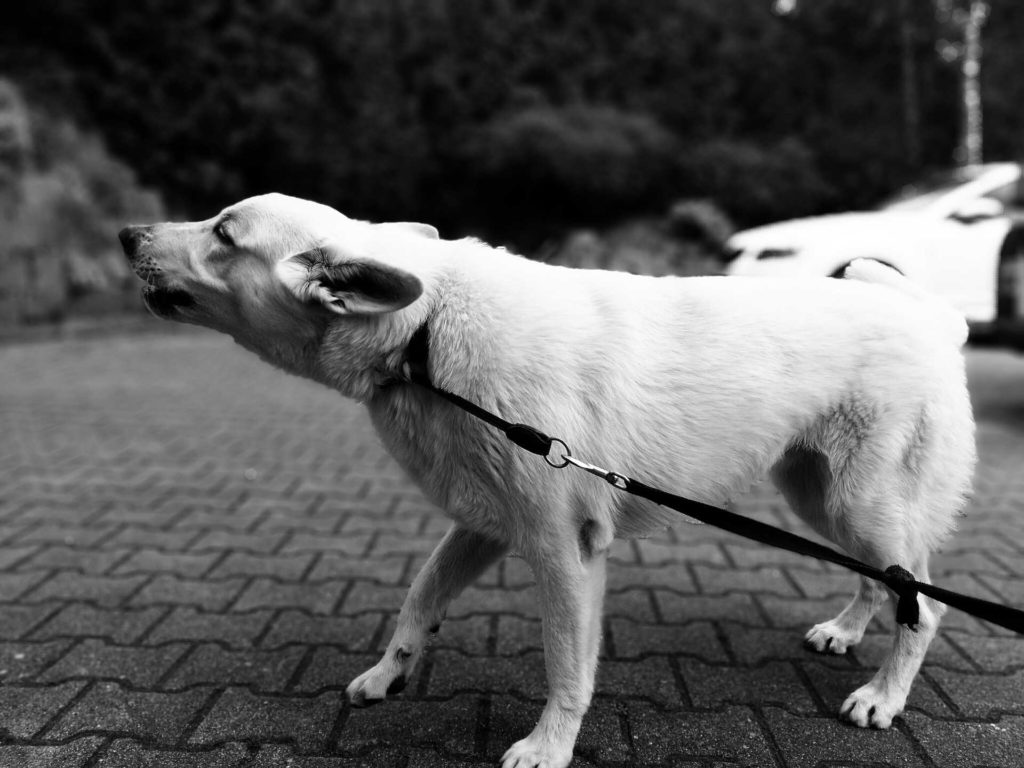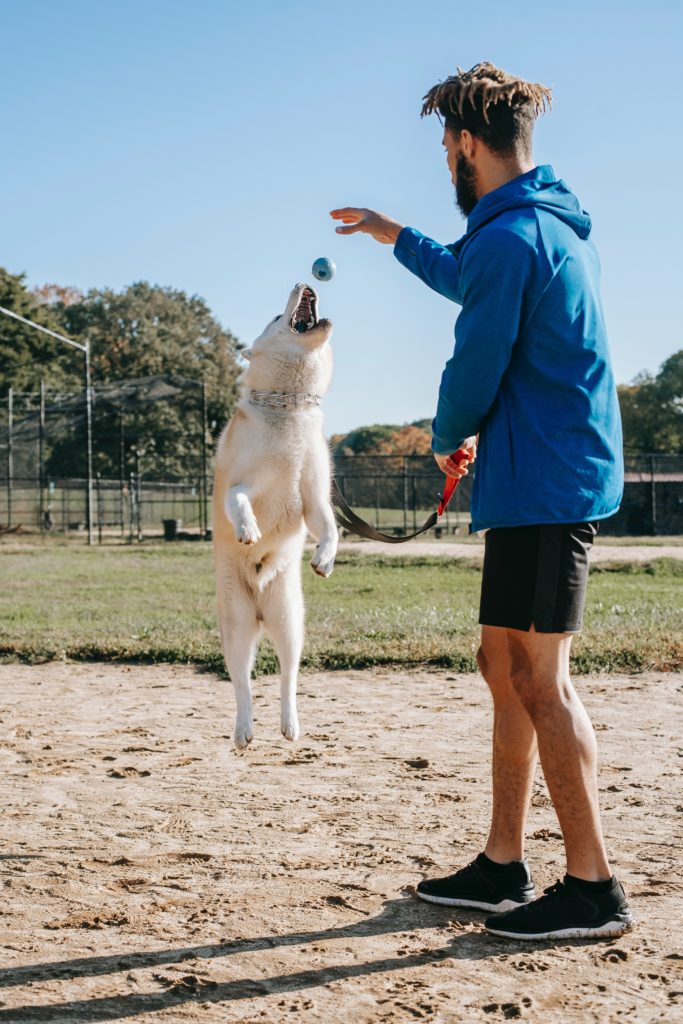

Whenever I knock at new client’s door and hear very loud and frantic barking, followed by a few choice swear words telling that dog to shut up - I generally know I am at the right address for my Dog Behaviourist session.
Any dog behaviourist will understand just how big a question this is. So when I ask the client “When does your dog bark?” the answer is usual the standard, “All the time and its driving me crazy!”
The reality, though, it might feel like it is all the time but dogs generally don’t bark all the time, there is always a trigger or a reason; dogs usually don’t bark just for fun, something has caused the dog to start. Noise next door, postman, car or someone just walking past your window. To be able to answer this question it can take some considerable time to tease out the information out of the client. This is why barking issues are usually a dog behaviourist domain. Dogs bark for a variety of reasons and in the profession, we call this “vocalisation”.

First rule out medical reasons by a dog behaviourist:
Frustration
Barking can be an outlet for frustration. For example, the dog sees a sandwich on the counter but can’t reach it. This might lead to the dog barking out of frustration, a bit like a human when we declare “dammit” when we fail to achieve something we were trying to.
Another place we might see frustration fairly frequently, is in dog training classes. A dog might bark in the direction of another dog because he wants to greet and is unable to do so. We often see an owner realise this and then release the lead so he can say “hello” to the dog next to him. Unfortunately, this actually actively reinforces the dog for barking and ensures barking will be repeated next time he wants to say "ii." We can even see combinations of attention seeking, boredom and frustration in classes where the dog looks at the owner for some eye contact, but the owner is listening to an instructor. A combination of frustration and attention seeking leads the dog to bark, whereupon, the owner looks at him right away. This is an automatic response for us and terribly difficult to override. However, this does lead to barking being reinforced. This is why the use of quiet food delivery activity toys in dog training classes can be so helpful as it prevents boredom, helps dogs to focus on something other than other dogs or their owners’ attention resulting in calm dogs in a class.

Territorial Barking
Dog behaviourist: Dogs may bark to make something go away. This barking is of a low pitch; other dogs and people recognise this and retreat further away. The warning bark is then rewarded as the other party moves away. So, barking can be territorial and its function is to keep other beings away from the dog. Many dogs practice barking all day (unbeknown to their owners) at dogs or people that pass their house. Inevitably these triggers disappear as they pass the house and then the dog stops barking as their job has been done. Often, without even knowing, dogs get a lot of practice at this when owners are out.The more it happens and gets reinforced, the more of a default behaviour it can become. When behaviours are performed frequently, our brains can develop short cuts for the behaviour, making them even more deep rooted into habits; this is something than an experienced dog behaviourist can address. So checking up with a dog behaviourist is very important.

Howling
Howling is a wolf behaviour and is known to draw members of the group back together. The howl is called and the other wolves join the group responding with howls. It is possible that this behavior has been passed down to some dogs who can howl when left alone. The theory is that a dog would howl as, ethologically, it brings members back to the individual and may play a role in separation related issues in dogs. Even if a dog does not howl when left, barking can be done through frustration; eventually the owner returns so the barking gets reinforced. This shows the dog is not coping with separation and needs some help in adjusting to this; this is where a dog behaviourist comes in.

Excitement Barking
Dogs can bark when very excited especially when it’s time for a walk. This tends to be of a higher pitch and can be quite continuous until the source of the excitement has gone out of sight. When playing games with our dogs, dogs can bark almost as if saying “Hurry up”. It is likely that frustration is also involved but dogs will often bark out of excitement when playing with their humans as well as when playing with some other dogs, or watching activities that are highly stimulating for them.
Stress Barking
Dogs can bark because they are stressed and it helps to release tension. I've even written a dog behaviourist article on stress in dogs. However, barking also CAUSES stress to humans. If a human is exposed to chronic barking in dogs it continually activates our autonomic nervous system and our endocrine system which can lead to stress. This is why nuisance barking can be so serious, and can have devastating effects on the mental health of those who live nearby, especially if this leads to sleep disruption. As a dog behaviourist, it is also one reason why I act on barking in classes, I find it emotionally wearing so I do everything within my power to solve barking issues in class.
Attention Seeking
The dog in the phone call was barking at his mum because she wasn’t giving him her full attention, she was talking to somebody else - me! By barking at her he got her to look at him so he found barking was an effective method of getting her attention. During the call she turned around and shouted ”shut up”, but actually, even though it temporarily made her feel better, he was rewarded for barking with her attention and the barking continued. This attention-barking behavior will never disappear if it continues to be successful for the dog.
Demanding Bark
Again, dogs might bark because they need something; the dog might be shut in the garden and want to come in. The dog might need to go to the toilet. Perhaps elicited by a little frustration, this bark is insistent and will continue until the dog's need has been met. The barking is reinforced by the need being met so will be repeated the next time this need occurs. Sometimes we want to reinforce this and as long as we know what the dog means he is providing useful information for us to act on. I take my wife’s little dog out a lot when I am with clients and he now barks, he is 12 years old, just to get a treat!!
Boredom Barking
Dogs that have little to occupy themselves will bark to alleviate boredom. Boredom barking often involves the same phrase at medium pitch repeated over and over at a medium speed with no urgency to it, "woof woof woof.........woof woof woof....... woof woof woof....." Just like a small child saying "are we nearly there yet.... are we nearly there yet.... are we nearly there yet...? This is the easiest barking problem to solve as, quite simply, by providing a dog with increased exercise and mental stimulation or a bit of company, the barking should stop. But don't just go out and get another dog to solve this problem as your dog might not like another dog and you may end up with different problems.
If you have a barking dog, and need to resolve the problem, first we need to identify WHY your dog barks. Once we know this, we can develop strategies to help them to stop barking. Please don't just punish your dog for barking because barking is communication. We all know that bad things happen when communications break down! Accept that your dog is trying to tell you something and make it your job to translate what he is saying or ask for help from a qualified dog behaviourist.
Greeting Barking
Dogs can bark when greeting known people. This is usually a couple of barks that stop when the person greets them. These barks with be of medium or high pitch if the person is a known friendly person.
Alarm Barking
Your dog is telling you that something is going on that he is worried about. A quite distinctive rapid volley in sequences of 2 to 4 higher pitch barks that may be preceded by some cautious “ buff...buff...buff” type barking. It is worth investigating this kind of bark as your dog thinks there might be an intruder. Of course, it could just be a fox in your garden. I have known of a very canny dog that used to do this to distract the other resident dog from the best seat in the house. As soon as that dog went to investigate his alarm call, the initiating dog nicked his seat and went to sleep!
Taught Barking
Some dogs can bark on cue, indeed I am currently trying to teach my working Golden Retriever to bark on command. We call it speak in the trade. Of course, I will also have to teach him to stop barking at command. I have worked with some clients who taught their dog to bark but did not teach him to stop barking.
Dog Trainer Thailand
2/4 Moo7 Soi 63 Chaoafa Road Chalong Phuket 83130dogtrainerthailand.com © 2023